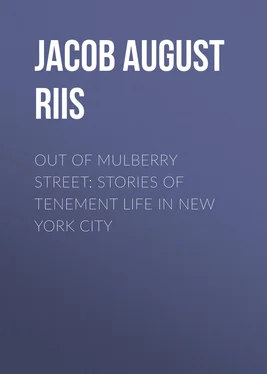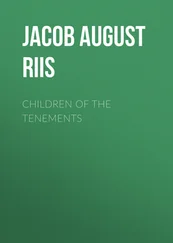Jacob August Riis - Out of Mulberry Street - Stories of Tenement life in New York City
Здесь есть возможность читать онлайн «Jacob August Riis - Out of Mulberry Street - Stories of Tenement life in New York City» — ознакомительный отрывок электронной книги совершенно бесплатно, а после прочтения отрывка купить полную версию. В некоторых случаях можно слушать аудио, скачать через торрент в формате fb2 и присутствует краткое содержание. Жанр: foreign_prose, foreign_antique, на английском языке. Описание произведения, (предисловие) а так же отзывы посетителей доступны на портале библиотеки ЛибКат.
- Название:Out of Mulberry Street: Stories of Tenement life in New York City
- Автор:
- Жанр:
- Год:неизвестен
- ISBN:нет данных
- Рейтинг книги:5 / 5. Голосов: 1
-
Избранное:Добавить в избранное
- Отзывы:
-
Ваша оценка:
- 100
- 1
- 2
- 3
- 4
- 5
Out of Mulberry Street: Stories of Tenement life in New York City: краткое содержание, описание и аннотация
Предлагаем к чтению аннотацию, описание, краткое содержание или предисловие (зависит от того, что написал сам автор книги «Out of Mulberry Street: Stories of Tenement life in New York City»). Если вы не нашли необходимую информацию о книге — напишите в комментариях, мы постараемся отыскать её.
Out of Mulberry Street: Stories of Tenement life in New York City — читать онлайн ознакомительный отрывок
Ниже представлен текст книги, разбитый по страницам. Система сохранения места последней прочитанной страницы, позволяет с удобством читать онлайн бесплатно книгу «Out of Mulberry Street: Stories of Tenement life in New York City», без необходимости каждый раз заново искать на чём Вы остановились. Поставьте закладку, и сможете в любой момент перейти на страницу, на которой закончили чтение.
Интервал:
Закладка:
“What do we receive at Christmas?” the teacher wants to know. The whole school responds with a shout, “Dolls and toys!” To the question, “Why do we receive them at Christmas?” the answer is not so prompt. But one youngster from Thompson street holds up his hand. He knows. “Because we always get ’em,” he says; and the class is convinced: it is a fact. A baby wails because it cannot get the whole tree at once. The “little mother”—herself a child of less than a dozen winters—who has it in charge cooes over it, and soothes its grief with the aid of a surreptitious sponge-cake evolved from the depths of teacher’s pocket. Babies are encouraged in these schools, though not originally included in their plan, as often the one condition upon which the older children can be reached. Some one has to mind the baby, with all hands out at work.
The school sings “Santa Lucia” and “Children of the Heavenly King,” and baby is lulled to sleep.
“Who is this King?” asks the teacher, suddenly, at the end of a verse. Momentary stupefaction. The little minds are on ice-cream just then; the lad nearest the door has telegraphed that it is being carried up in pails. A little fellow on the back seat saves the day. Up goes his brown fist.
“Well, Vito, who is he?”
“McKinley!” shouts the lad, who remembers the election just past; and the school adjourns for ice-cream.
It is a sight to see them eat it. In a score of such schools, from the Hook to Harlem, the sight is enjoyed in Christmas week by the men and women who, out of their own pockets, reimburse Santa Claus for his outlay, and count it a joy—as well they may; for their beneficence sometimes makes the one bright spot in lives that have suffered of all wrongs the most cruel—that of being despoiled of their childhood. Sometimes they are little Bohemians; sometimes the children of refugee Jews; and again, Italians, or the descendants of the Irish stock of Hell’s Kitchen and Poverty Row; always the poorest, the shabbiest, the hungriest—the children Santa Claus loves best to find, if any one will show him the way. Having so much on hand, he has no time, you see, to look them up himself. That must be done for him; and it is done. To the teacher in this Sullivan-street school came one little girl, this last Christmas, with anxious inquiry if it was true that he came around with toys.
“I hanged my stocking last time,” she said, “and he didn’t come at all.” In the front house indeed, he left a drum and a doll, but no message from him reached the rear house in the alley. “Maybe he couldn’t find it,” she said soberly. Did the teacher think he would come if she wrote to him? She had learned to write.
Together they composed a note to Santa Claus, speaking for a doll and a bell—the bell to play “go to school” with when she was kept home minding the baby. Lest he should by any chance miss the alley in spite of directions, little Rosa was invited to hang her stocking, and her sister’s, with the janitor’s children’s in the school. And lo! on Christmas morning there was a gorgeous doll, and a bell that was a whole curriculum in itself, as good as a year’s schooling any day! Faith in Santa Claus is established in that Thompson-street alley for this generation at least; and Santa Claus, got by hook or by crook into an Eighth-Ward alley, is as good as the whole Supreme Court bench, with the Court of Appeals thrown in, for backing the Board of Health against the slum.
But the ice-cream! They eat it off the seats, half of them kneeling or squatting on the floor; they blow on it, and put it in their pockets to carry home to baby. Two little shavers discovered to be feeding each other, each watching the smack develop on the other’s lips as the acme of his own bliss, are “cousins”; that is why. Of cake there is a double supply. It is a dozen years since “Fighting Mary,” the wildest child in the Seventh-Avenue school, taught them a lesson there which they have never forgotten. She was perfectly untamable, fighting everybody in school, the despair of her teacher, till on Thanksgiving, reluctantly included in the general amnesty and mince-pie, she was caught cramming the pie into her pocket, after eying it with a look of pure ecstasy, but refusing to touch it. “For mother” was her explanation, delivered with a defiant look before which the class quailed. It is recorded, but not in the minutes, that the board of managers wept over Fighting Mary, who, all unconscious of having caused such an astonishing “break,” was at that moment engaged in maintaining her prestige and reputation by fighting the gang in the next block. The minutes contain merely a formal resolution to the effect that occasions of mince-pie shall carry double rations thenceforth. And the rule has been kept—not only in Seventh-Avenue, but in every industrial school—since. Fighting Mary won the biggest fight of her troubled life that day, without striking a blow.
It was in the Seventh-Avenue school last Christmas that I offered the truant class a four-bladed penknife as a prize for whittling out the truest Maltese cross. It was a class of black sheep, and it was the blackest sheep of the flock that won the prize. “That awful Savarese,” said the principal in despair. I thought of Fighting Mary, and bade her take heart. I regret to say that within a week the hapless Savarese was black-listed for banking up the school door with snow, so that not even the janitor could get out and at him.
Within hail of the Sullivan-street school camps a scattered little band, the Christmas customs of which I had been trying for years to surprise. They are Indians, a handful of Mohawks and Iroquois, whom some ill wind has blown down from their Canadian reservation, and left in these West-Side tenements to eke out such a living as they can weaving mats and baskets, and threading glass pearls on slippers and pin-cushions, until, one after another, they have died off and gone to happier hunting-grounds than Thompson street. There were as many families as one could count on the fingers of both hands when I first came upon them, at the death of old Tamenund, the basket-maker. Last Christmas there were seven. I had about made up my mind that the only real Americans in New York did not keep the holiday at all, when, one Christmas eve, they showed me how. Just as dark was setting in, old Mrs. Benoit came from her Hudson-street attic—where she was known among the neighbors, as old and poor as she, as Mrs. Ben Wah, and believed to be the relict of a warrior of the name of Benjamin Wah—to the office of the Charity Organization Society, with a bundle for a friend who had helped her over a rough spot—the rent, I suppose. The bundle was done up elaborately in blue cheese-cloth, and contained a lot of little garments which she had made out of the remnants of blankets and cloth of her own from a younger and better day. “For those,” she said, in her French patois, “who are poorer than myself”; and hobbled away. I found out, a few days later, when I took her picture weaving mats in her attic room, that she had scarcely food in the house that Christmas day and not the car-fare to take her to church! Walking was bad, and her old limbs were stiff. She sat by the window through the winter evening, and watched the sun go down behind the western hills, comforted by her pipe. Mrs. Ben Wah, to give her her local name, is not really an Indian; but her husband was one, and she lived all her life with the tribe till she came here. She is a philosopher in her own quaint way. “It is no disgrace to be poor,” said she to me, regarding her empty tobacco-pouch; “but it is sometimes a great inconvenience.” Not even the recollection of the vote of censure that was passed upon me once by the ladies of the Charitable Ten for surreptitiously supplying an aged couple, the special object of their charity, with army plug, could have deterred me from taking the hint.
Читать дальшеИнтервал:
Закладка:
Похожие книги на «Out of Mulberry Street: Stories of Tenement life in New York City»
Представляем Вашему вниманию похожие книги на «Out of Mulberry Street: Stories of Tenement life in New York City» списком для выбора. Мы отобрали схожую по названию и смыслу литературу в надежде предоставить читателям больше вариантов отыскать новые, интересные, ещё непрочитанные произведения.
Обсуждение, отзывы о книге «Out of Mulberry Street: Stories of Tenement life in New York City» и просто собственные мнения читателей. Оставьте ваши комментарии, напишите, что Вы думаете о произведении, его смысле или главных героях. Укажите что конкретно понравилось, а что нет, и почему Вы так считаете.












